Self-Management:
A Workbook for Ambitious Professionals
We’re in an era of unprecedented autonomy and responsibility at work. But to succeed in this new environment, you must be able to manage your own productivity and performance. To help you do so, we created this comprehensive self-management workbook. For each of the seven self-management skills listed, you will also find a tool, template, or assessment that can be immediately applied to your day-to-day life on the job.
Download the PDF (English & French Included)
Introduction
We’re in an era of unprecedented opportunities. The global experiment of remote work facilitated by the COVID-19 pandemic went better than anyone could have thought. Now, companies worldwide have begun to turn temporary work-from-home measures into formal “work from anywhere” policies. For employees, this has opened up a world of career opportunities.
However, to succeed in this new environment, you must manage your productivity and performance. You need to be able to work independently, self-motivate, hold yourself accountable, manage your output, and keep yourself on track day-in and day-out. Doing so is called self-management, and while it has always been important, it is especially so today.
This workbook will dive into the definition of self-management, why it’s crucial, and outline seven self-management skills you will need going forward - regardless of whether you work remotely. For each skill, you also find a tool, template, or assessment that can be used in your day-to-day life to manage yourself more effectively.
What Is Self-Management and Why Is It Important?
Self-management is your willingness and ability to take responsibility for your behaviors that impact your productivity, performance, and goals. Rather than relying on your direct leader to provide motivation, discipline, and encouragement, you do it for yourself. In essence, you act as your own boss. The skills required to do this include but are not limited to organization, time management, resilience, personal accountability, critical thinking, goal setting, and interpersonal skills.
When you have such skills, Training Industry pointed out that you will have “all the power you need to build relationships, acquire resources, and do your best work. It gives you all the autonomy you need to achieve purpose and meaning at work: to make the decisions that you are in the best position to make, to manage business processes, and decide for yourself what you need to learn and do to be successful.”
So, what’s the importance of self-management?
First and foremost, self-management allows you to do your job and do it well, especially in the world of remote and hybrid work. For instance, the Journal of Facilities Management found that self-management had the highest positive correlation with individual productivity. While the Journal of Vocational Behavior found that self-management strategies increase performance, innovation, and creativity, which boosts employee engagement.
Self-management doesn’t just help you succeed in the job you have right now; it puts you in the driver’s seat of your career going forward. Robert Kelley made note of this in his book, How to Be a Star at Work. While it may have been written in 1998, the words ring as accurate today as ever: “Average performers see self-management as time management: ‘If I get my work done on time, then I’m a good self-manager.’ To stars, that’s just the beginning. You’re expected to manage your time well. You’re expected to manage your projects well. Real self-management means managing not only your work but also your relationships with people, your career, and your career assets over time.”
7 Self-Management Skills
To effectively manage yourself, several individual self-management skills are required. These include, but are not limited to, goal setting, organization, time management, personal accountability, resilience, critical thinking, and interpersonal skills. In the following section, we’ll review the importance of these seven self-management skills, as well as provide you with a related tool, template, or assessment that you can immediately implement to manage yourself better.
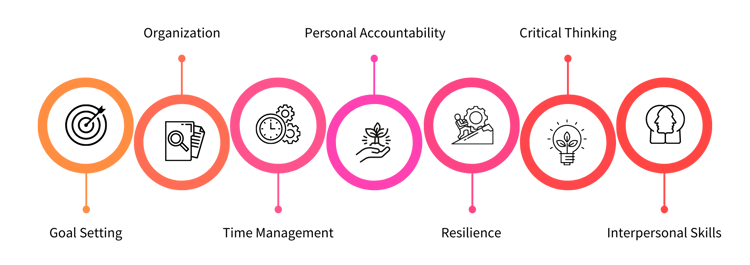
Goal Setting
Self-management is all about taking control of your success and your career, and to do that effectively, you must know what you want to achieve and proactively create plans to make it a reality. This is referred to as goal setting, and it’s important for self-management as it allows you to make decisions, big and small, that get you closer to your desired outcome every day. Moreover, it has been found to boost focus, motivation, productivity, and performance.
The key is to clearly define your professional goals and make them challenging yet attainable. If you do so, you will be 10x more likely to succeed and achieve those goals than those who do not. In fact, the following worksheets will walk you through the four steps of effective goal setting: brainstorming, writing goal statements, creating an action plan, and tracking your progress.
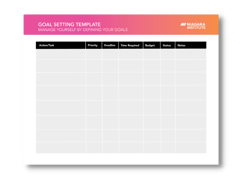
Download the workbook with the
Goal Setting Worksheets
Organization
To manage yourself effectively, you need to have a strong grasp on your time, energy, and workspace. You cannot constantly be searching or losing important documents and emails, showing up to meetings late and unprepared, or missing important deadlines. Not only does this impede your ability to do your best work and stall your productivity, but it also frustrates your leaders and colleagues, which may eventually cause them to avoid asking you for help or offering you opportunities.
Unfortunately, a lack of organization is all too common in the workplace. In one study of 18,000 leaders, 57% lost six working hours per week due to disorganization. Meanwhile, another study found that employees spend 8% of every workday searching for files and waste time recreating between 5-15% of their company’s digital assets after giving up the hunt.
To avoid wasting time that could otherwise be spent forwarding your career, you need to take control of things you can personally organize, such as your desk, email inbox, digital files, and calendar. You should also implement a weekly or daily to-do list in order to keep track of agreements you make, plans that change, and actions that need to be taken. Having a document like this will give you a solid understanding of your workload and capacity so that you can confidently answer when someone asks for help or assigns you a task.
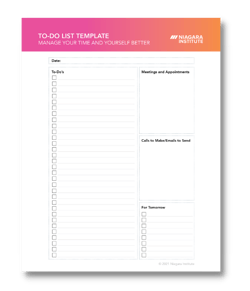
Download the workbook with the
Daily To-Do List Template
Time Management
When it comes to self-management, organization and time management go hand-in-hand. While organizational skills will clarify what needs to get done for the day or week, time management will allow you to plan when those things get done based on their urgency or importance. Not only will this boost your focus and minimize distractions, but it will also help ensure you are prioritizing productivity, not just activity.
Two tools that will help you manage your time and yourself are the Eisenhower Matrix and Niagara Institute’s Time Blocking Template. First, start with the Eisenhower Matrix to determine the urgency and importance of each task on your to-do list. Doing so will make it far easier to prioritize the time you have available. Then, using our Time Blocking Template, pencil in the tasks you have deemed to be the top priority, along with any meetings or appointments. From there, you will be able to see what time you have left and can fill it in accordingly.
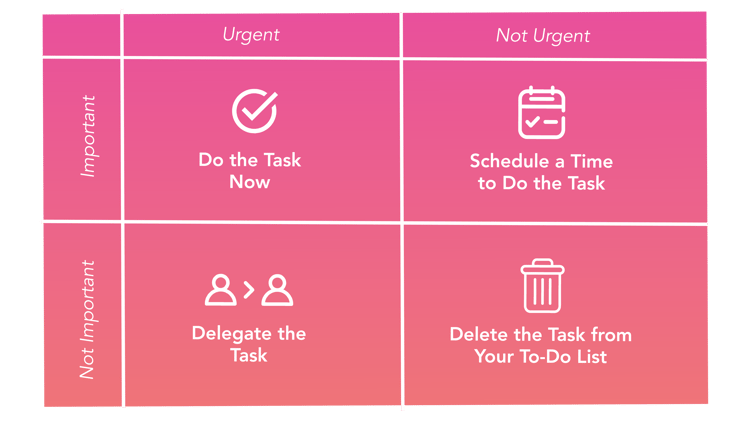
If you’re unsure if the time required to do this is worth it, keep in mind that it has been found that if you spend just 10-12 minutes planning your workday, you can save at least 2 hours of wasted time and effort throughout the day.
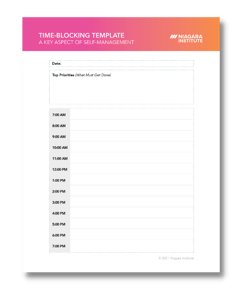
Download the workbook with the
Time-Blocking Template
Personal Accountability
In the workplace, personal accountability refers to your willingness to take ownership of and answer for your behaviors, decisions, obligations, and judgments. If you have a strong sense of personal accountability, you don’t hide your failures, run from your mistakes, ignore problems, or blame others or external circumstances. You’re well aware of how you contributed to the outcome and make the appropriate apologies or course corrections without needing to be prompted by someone else, like your leader.
Developing self-leadership skills can enhance your personal accountability by encouraging you to take proactive control over your actions, decisions, and outcomes. Self-leadership empowers you to set personal goals, manage your responsibilities effectively, and continually assess your performance without external prompting.
When personal accountability is consistently demonstrated, it can help you foster trust, earn respect, and solidify your reputation among your leaders and peers as someone who is dependable.
Want to find out how personally accountable you are as of today? Take our Personal Accountability Assessment.
Resilience
In today’s world, it’s not a matter of if you will experience adversity, change, loss, failure, or risk, but a matter of when. That is why it is so imperative to build up your resilience. Resilience refers to your ability to cope with stress and pressure, overcome challenges, bounce back from failures and setbacks, and deal with crises as they arise. It allows you to maintain productivity, make sound decisions quickly, and creatively problem-solve.
However, according to MIT Sloan Management Review research, loneliness can actually compromise your ability to be resilient at work. In fact, employees who reported “being part of a team” were 2.7 times more likely to be highly resilient than those who didn’t. Moreover, Harvard Business Review noted that “it’s not just about having a network of supporters, but in truly connecting with them when you need them most. It’s in the actual interactions themselves — the conversations that validate your plans, reframe your perspective on a situation, help you laugh and feel authentic with others, or just encourage you to get back up and try again because the battle is a worthy one — that we become resilient.”
This HBR article goes on to note seven sources of resilience, which will vary in importance to you “based on your unique history, personality, and professional/personal context.” We encourage you to review those sources and consider which are most important to you to cultivate them in your life on the job.
8 Sources of Resilience (Source: HBR)
- Vision - Helps you see the path forward
- Perspective - Helps you maintain perspective when roadblocks occur
- Purpose - Reminds you of the purpose or meaning behind your work
- Humor - Helps you laugh at yourself and the situation
- Work Surge - Helps you manage influxes of work
- Politics - Helps you understand people or the politics at play
- Pushback - Helps you find the confidence to stand up and advocate for yourself
- Empathy - Provides you with empathetic support to let go of negative feelings
Critical Thinking
By definition, critical thinking is the process of gathering, analyzing, and evaluating information to thoroughly understand a topic/problem and make a decision, if necessary. Critical thinkers do not take things at face value, but rather, they ask questions and challenge assumptions so that they can come to their own conclusions.
Critical thinking is a skill anyone looking to manage themselves effectively should have. It will help you become more self-sufficient, enable you to make sound decisions, and problem-solve effectively whether on your own or in collaboration with others. Moreover, it is a highly desirable skill among employers. According to Gartner, it will only continue to be so, given that “by 2028, the most high-value work will be cognitive in nature.”
To help you think more critically and independently, we recommend starting by asking yourself more questions. Before you make a decision, form an opinion, or take a problem to someone else, challenge yourself to ask more questions about the topic at hand. You might be surprised what conclusions you can come to all on your own that you might not have otherwise.
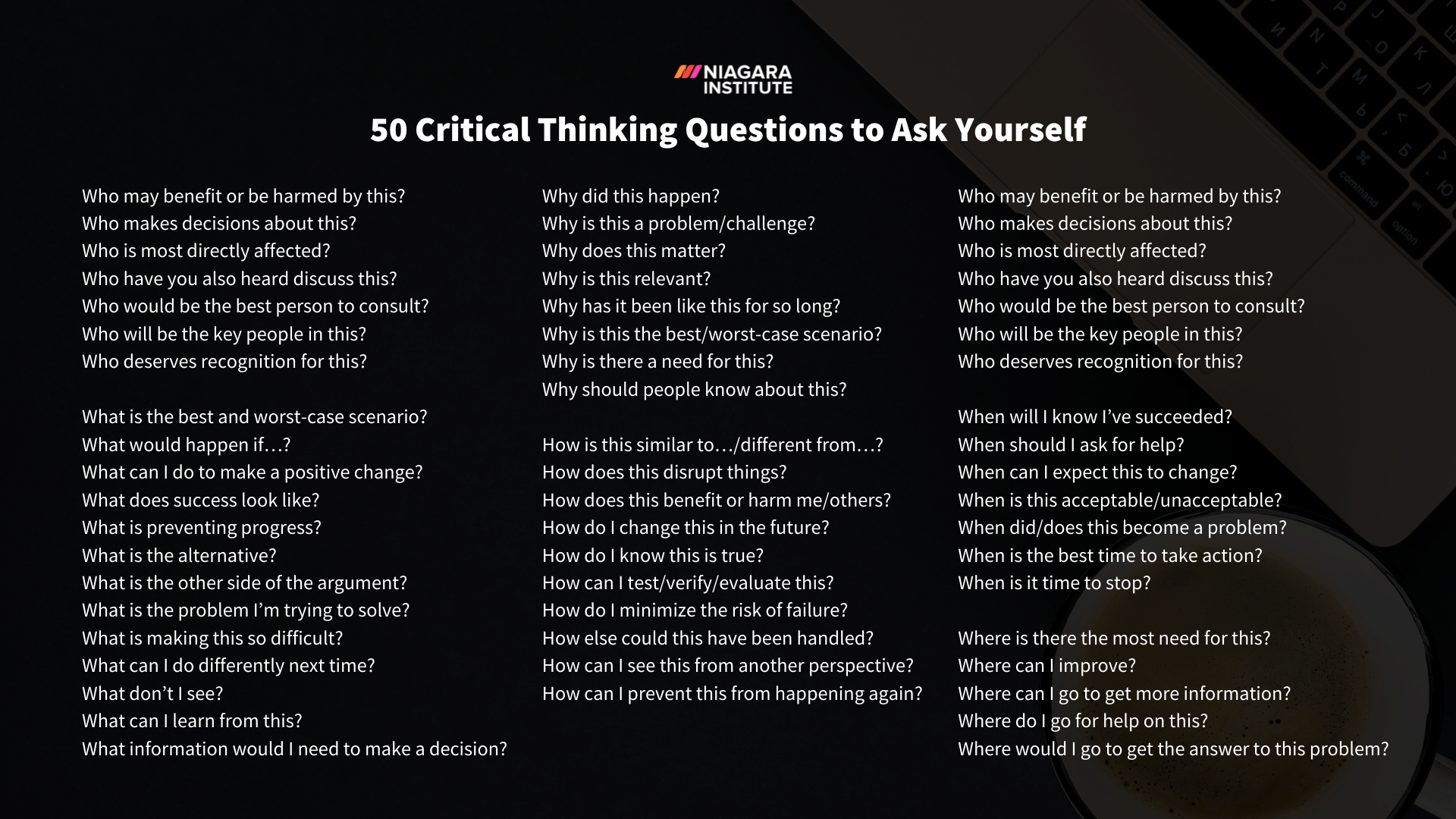
50 Critical Thinking Questions to Ask Yourself
- Who may benefit or be harmed by this?
- Who makes decisions about this?
- Who is most directly affected?
- Who have you also heard discuss this?
- Who would be the best person to consult?
- Who will be the key people in this?
- Who deserves recognition for this?
- What is the best and worst-case scenario?
- What would happen if…?
- What can I do to make a positive change?
- What does success look like?
- What is preventing progress?
- What is the alternative?
- What is the other side of the argument?
- What is the problem I’m trying to solve?
- What is making this so difficult?
- What can I do differently next time?
- What don’t I see?
- What information would I need to make a decision?
- What can I learn from this?
- Where is there the most need for this?
- Where can I improve?
- Where can I go to get more information?
- Where do I go for help on this?
- Where would I go to get the answer to this problem?
- When will I know I’ve succeeded?
- When should I ask for help?
- When can I expect this to change?
- When is this acceptable/unacceptable?
- When did/does this become a problem?
- When is the best time to take action?
- When is it time to stop?
- Why did this happen?
- Why is this a problem/challenge?
- Why does this matter?
- Why is this relevant?
- Why has it been like this for so long?
- Why is this the best/worst-case scenario?
- Why is there a need for this?
- Why should people know about this?
- How is this similar to…/different from…?
- How does this disrupt things?
- How does this benefit or harm me/others?
- How do I change this in the future?
- How do I know this is true?
- How can I test/verify/evaluate this?
- How do I minimize the risk of failure?
- How else could this have been handled?
- How can I see this from another perspective?
- How can I prevent this from happening again?
Interpersonal Skills
None of us work in a bubble. At some point or another, you will need to work with others to get something done or make a decision. When that time comes, it is hugely beneficial to have strong interpersonal skills, which will allow you to effectively communicate, interact, and work with individuals and groups. In essence, your interpersonal skills will “grease the wheels” and help make interactions with others go more smoothly to meet your personal needs and build strong working relationships based on trust.
To do this, you need interpersonal skills such as communication, listening, collaboration, emotional intelligence, persuasion, negotiation, and conflict resolution. Not only are these skills “in demand” by employers, according to LinkedIn, but they’re also essential when working in a hybrid or remote work environment where there is less face-to-face interaction and more room for potential miscommunications.
To help you develop these interpersonal skills, we’ve provided a personal development plan template. Use this template to capture which skills you want to develop, the steps you will take to do so (training, professional coaching, etc.), the resources required, and the priority compared to other skills on the list.
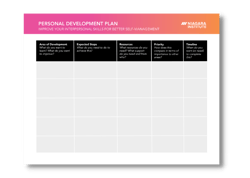
Download the workbook with the
Interpersonal Skills Personal Development Plan
Conclusion: How Can I Improve My Self-Management Skills?
Self-management is essential to perform at your best, optimize your productivity, and meet your short and long-term goals. It will support your career advancement and open up doors of opportunity that you may not have otherwise.
So, how can you improve your self-management skills? Along with implementing the tools in this workbook, we encourage you to seek professional development opportunities that focus on the seven skills noted: goal setting, organization, time management, personal accountability, resilience, critical thinking, and interpersonal skills.
Fortunately, you can find all of that and more with Niagara Institute. From our lineup of training programs on leadership, communication, business acumen, and inclusion to a roster of highly qualified professional coaches, you can access the support and resources you need to master self-management.

